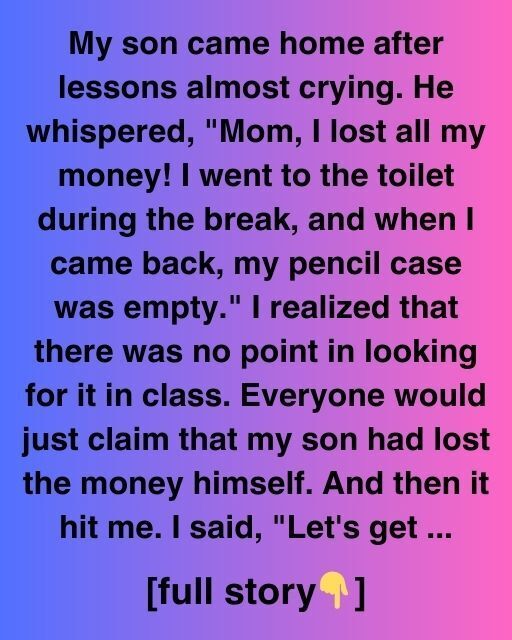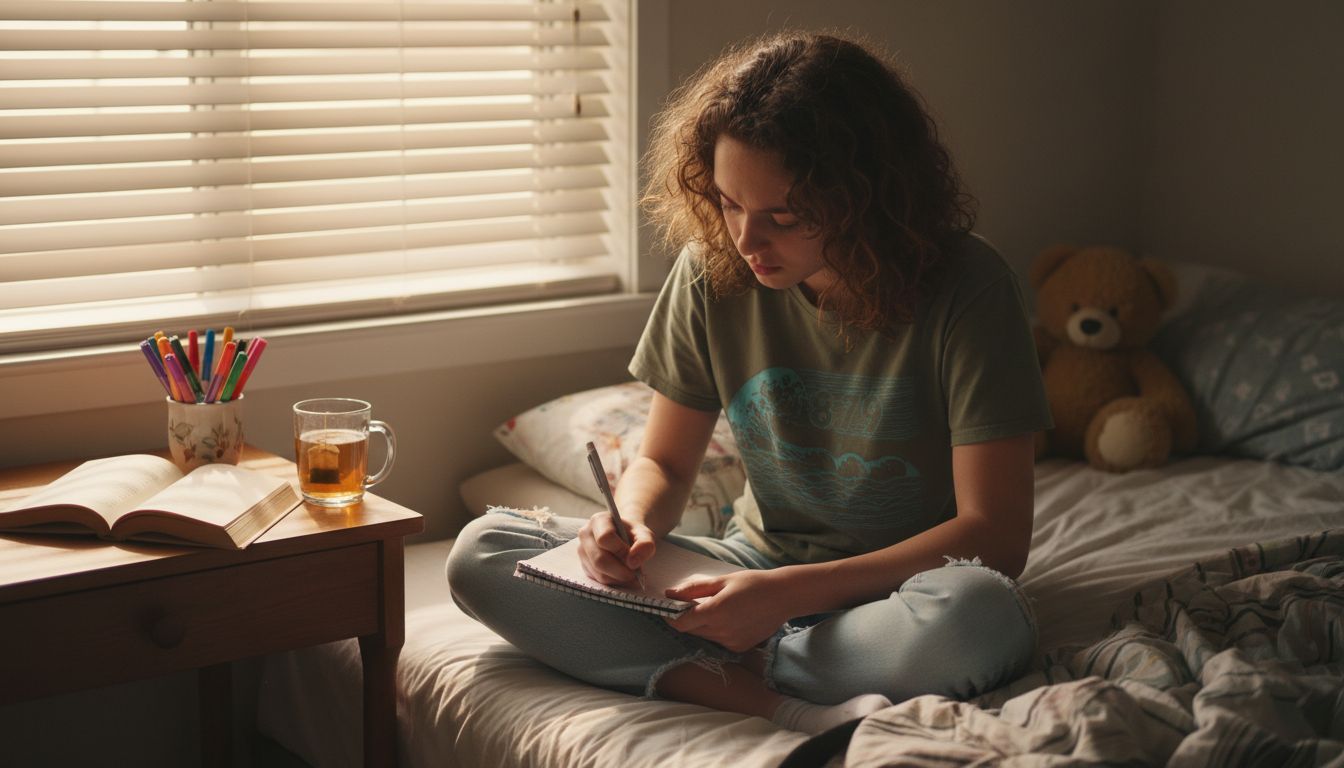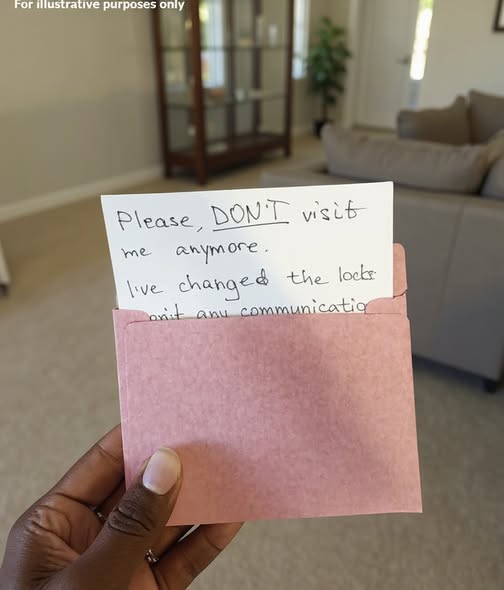
My son came home after lessons almost crying. He whispered, “Mom, I lost all my money! I went to the toilet during the break, and when I came back, my pencil case was empty.” I realized that there was no point in looking for it in class. Everyone would just claim that my son had lost the money himself. And then it hit me. I said, “Let’s get creative.”
He wiped his nose with his sleeve and looked at me confused. “Creative?” he asked.
I nodded and smiled. “Yes. You know how we’ve been talking about doing a small project together this summer? How about we start early?”
He didn’t answer immediately. I could see the worry still swimming in his eyes. It wasn’t just about the money—he felt betrayed, embarrassed maybe. He had saved that small amount for weeks, doing chores and saying no to candy from the school vending machine.
“I just want it back,” he mumbled.
“I know, sweetheart. But sometimes we don’t get back what we lost. Instead, we build something better.”
I saw him blink slowly, like he was trying to decide if he believed me. Then he whispered, “Like what?”
I got up, went to the pantry, and pulled out a bag of lemons. “We’re going to sell lemonade.”
He looked at the lemons, then back at me. “Like with a stand? Like in cartoons?”
“Exactly like that,” I said. “We’ll do it this Saturday. Just you and me.”
He didn’t smile, not yet, but I saw a flicker of something in his face—hope, maybe. And for that moment, it was enough.
The next day, after school, we made a list. We needed lemons, sugar, cups, ice, and a sign. I gave him an old notebook to plan everything out, and he took it more seriously than I expected. He even started watching videos about how to make the perfect lemonade ratio.
Saturday morning came, and we set up a little wooden table just outside our house. We lived in a quiet neighborhood, but it had enough foot traffic for a small stand. We painted a sign that said: “Leo’s Lemonade – 50 cents a cup. Fresh. Cold. Honest.”
He insisted on adding “Honest” at the end. I didn’t ask why, but I had a feeling I knew.
We had barely opened when our neighbor, Mr. Franco, came by. He bought a cup, took a sip, and raised his eyebrows. “This is good! You made this yourself, Leo?”
Leo nodded, and I watched his chest puff out just a little.
“Well then,” Mr. Franco said. “I’ll take another. And keep the change.”
After he left, Leo whispered, “He gave us two dollars.”
“That’s your first profit,” I said. “Feels good, doesn’t it?”
He nodded, this time with a tiny smile.
The stand did better than we expected. By noon, we had sold over thirty cups. People from down the street started coming over. A group of teenagers on bikes stopped, bought five cups, and took selfies with the sign. Even the mail carrier bought one and told us it was the best lemonade she’d had in years.
Around 2 PM, when the sun was high and we were both sweating, Leo sat down and looked at the small cash box we were using.
“Mom,” he said, “we already made more than I lost.”
I sat beside him and ruffled his hair. “I know. And you did it all honestly.”
That word again. “Honestly.” I finally asked him, “Leo… why do you keep saying that?”
He hesitated. Then he said quietly, “Because I think I know who took my money.”
My stomach dropped a bit, but I tried to stay calm. “Do you want to tell me?”
“It was probably Ivan. He was watching me count it in the morning, and he’s always bragging about how he never brings lunch but still eats. And when I got back from the toilet, he was sitting near my desk, even though his seat is two rows away.”
I didn’t say anything for a few seconds. I wanted to be careful.
“Do you think he took it for sure?”
Leo shook his head. “Not for sure. But I think… yeah.”
“Then what do you want to do about it?”
He looked up at me. “Nothing. That’s why I wanted to say we’re honest. Because if he took it, I don’t want to do the same. I want to show that you can still win by being good.”
It was such a simple sentence, but it hit me like a wave. I hugged him.
“You’re already winning, baby,” I whispered.
Over the next few weekends, we kept the stand going. We upgraded a bit—added a cooler for the ice, a donation jar, and even some cookies we baked together. People started coming just to talk to Leo. Some told him stories from their own childhoods. Others brought their dogs, and we added a small water bowl for them too.
Then, one Sunday afternoon, something unexpected happened.
A boy came walking slowly toward the stand. It was Ivan.
Leo stiffened next to me. I could tell he didn’t know what to do.
Ivan stopped a few feet away, hands stuffed in his pockets. “Hey,” he said, not meeting our eyes. “I heard your lemonade is good.”
Leo looked at me, then back at Ivan. “Want a cup?” he asked carefully.
Ivan nodded.
Leo poured one, handed it to him. Ivan took a sip, said nothing for a few seconds. Then he muttered, “I’m sorry.”
I pretended to adjust the napkins so I wouldn’t interrupt.
“For what?” Leo asked.
“For… for taking your money,” Ivan finally said. “I was hungry, and… and I thought you’d never notice. But I felt really bad.”
Leo was quiet. Then he said, “Okay.”
Ivan looked surprised. “Okay?”
“Yeah,” Leo shrugged. “You could’ve just asked. But thanks for telling me.”
There was an awkward pause. Then Ivan asked, “Can I help? At the stand?”
I looked at Leo. It was his call.
After a moment, Leo nodded. “Okay. But only if you help squeeze the lemons.”
Ivan grinned. “Deal.”
From that day on, Ivan showed up every Saturday. He helped set up, clean, and even came up with a new recipe with mint leaves. They worked side by side like they’d been friends forever.
A few weeks later, they decided to use part of their profits to buy sandwiches and drinks for some homeless people in the city. They said, “We’re making money honestly. We should use it for something good.”
Word got around. A local paper even did a small story about the “Two Lemonade Boys” and their idea of turning a stolen moment into something better. Donations poured in. People came from other neighborhoods just to meet them.
At the end of the summer, they had raised over $600.
Leo and Ivan decided to split it. Half they kept for themselves. The other half they donated to a food bank.
Before school started again, we had a small celebration. Lemonade, cookies, and laughter.
That night, I tucked Leo in. He looked up at me and asked, “Do you think it was good that my money got stolen?”
I smiled. “I think something good came out of it. And that matters more.”
He nodded, eyes already drifting.
As I closed the door, I realized that what began as a loss had turned into something much deeper—a lesson about kindness, forgiveness, and honesty.
We often think justice looks like punishment. But sometimes, the best justice is transformation.
Leo could’ve blamed, shouted, demanded.
Instead, he built.
He forgave.
And he inspired someone else to change.
If you’ve ever felt like someone wronged you and you couldn’t do anything about it, remember this: you still have the power to decide what you do next.
You can turn a loss into a lesson.
You can choose to rebuild with integrity.
And you might just help someone else find their way too.
If this story touched you, share it with someone who needs a little hope today. And don’t forget to like—it helps more people see that kindness still matters.




